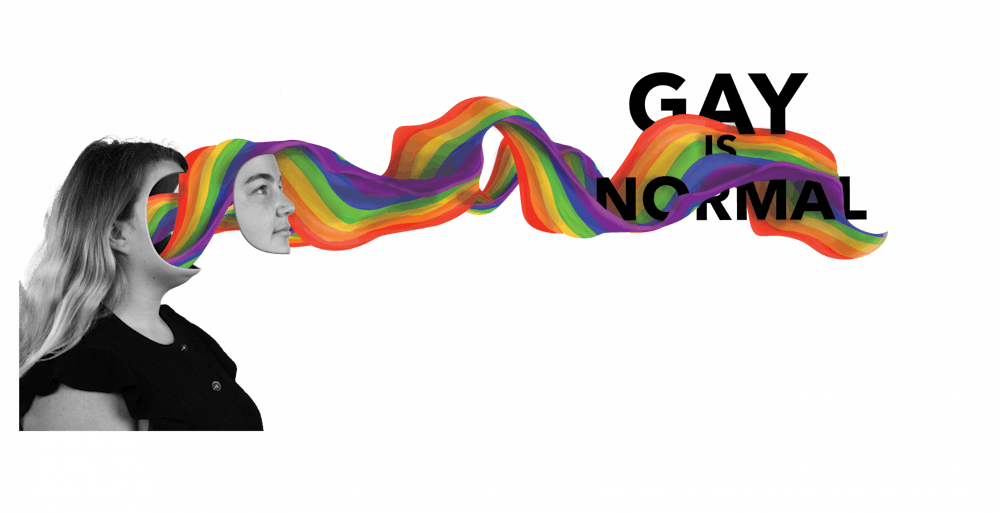
Elissa Maudlin is a junior journalism news major and writes “Abstraction” for The Daily News. Her views do not necessarily reflect those of the newspaper.
It all started with Billie Eilish.
One day this past summer, I casually mentioned that I found her attractive and unknowingly set my loved ones’ worlds on fire in a burst of happy, bisexual flames. For the first time, I had mentioned liking a girl, and their allyship erupted from their well-intentioned hearts through recurring remarks about it the following weeks.
To them, it was exciting. This was the turning of a leaf in my identity journey, and saying phrases all culminating around Billie Eilish being “my girl” seemed to promote acceptance and encouragement.
In theory, this is the way we are supposed to treat people with different sexualities. Many people are taught in diversity classes to honor, admire and uplift those who are seen as different. The people around me were doing everything right. However, if this is the correct way to treat people who are considered different from the norm, why did I still feel self-conscious about simply liking a girl?
The answer is I didn’t want to be treated differently.
Maybe it comes from systematic judgment or my own paranoid shame, but, after all this time, I still struggle with my sexual identity. I’m still slightly uncomfortable discussing my attraction and worry that writing about this vulnerable part of me will be too inappropriate for readers. Believe it or not, I’ve broken down many walls to get to this place.
The peculiar thing is that I grew up in an accepting home and was never taught being LGBTQ was wrong. Still, the shame lingers, and I’ve always wondered where it comes from.
There have been major changes legally in recent years when it comes to gay rights. In October 2009, the Matthew Shepard and James Byrd, Jr. Hate Crimes Prevention Law was signed, and, in December 2010, “Don’t Ask, Don’t Tell,” was repealed, a law where LGBTQ people couldn’t fight in the military and were forced to hide their identity. But, 2015 marked the biggest win for queer rights when gay marriage was finally legalized in all 50 states with Obergefell v. Hodges.
I believe we’ve come a long way when it comes to how we treat others with different identities. On the flipside, though, I wonder if we’ve shot too far in the opposite direction: shoving people with different identities into the limelight and placing them on pedestals so high up that their every move feels broadcast.
The big problem with this is we haven’t gotten away from one of the core beliefs that we started with: those who have different identities are innately different.
It sounds strange, especially with the word “different” being used to describe the same groups I believe we should treat the same. To make someone feel different is a double-edged sword — it can leave a person feeling special and unique, but it can also isolate and single them out.
Perhaps allies are doing this because they are trying to repent for how queer people have historically been treated, like the tragic murder of Matthew Shepard, the murder of Harvey Milk, the first openly gay elected official in California history and the police invasion of The Stonewall Inn. Maybe gay allies are subconsciously trying to make up for these incidents by giving our identity more attention and more praise.
However, doesn’t that just reiterate the fact that society still considers queer people different from the norm?
Doesn’t this make it harder for queer people to acclimate in society as just another romantic relationship or personal identity?
In my own journey, all I’ve ever wanted is to feel normal. My own insecurities with my bisexuality already make me feel slightly weird, and, when any unnecessary attention is added to that, it makes all those feelings worse. I find myself measuring every facial movement, every look of the eye and every word to see if others are uncomfortable when I talk about my identity.
The difficult part of this is the people uplifting me want me to feel accepted, loved and cherished. They go out of their way to make me understand they admire this part of me. It can feel odd criticizing this because they try so hard to be good allies.
Then, I see how this plays out on the broader spectrum. When I looked up “gay Disney character,” I counted at least seven articles that specifically talked about sexuality, as if it was something edgy. From my experience, movies like Brokeback Mountain seem more exciting and taboo to watch than movies with straight relationships, even with equally sexual content.
Queer people often feel obligated to announce who they are and are met with applause, tears and words of affirmation while straight people just bring home their opposite gendered partner, and no one really cares.
There is still this looming idea that LGBTQ people are different. We are seen as special, unique, brave, edgy, but all those adjectives give off the same impression: we’re still different.
We’re still an “other.”
We’re still not normal, and, for someone still coming to grips with living in their identity with confidence, that’s all we really want to be.
For some of us, we just want to be seen as normal.
Contact Elissa Maudlin with comments at ejmaudlin@bsu.edu or on Twitter @ejmaudlin.




